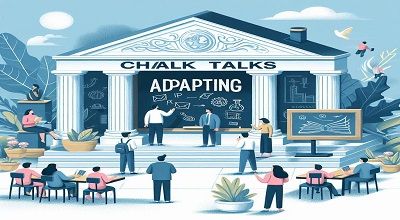Adapting Chalk Talks to Promote Student Engagement
Hello, users, I am here to find some information about adapting chalk talks to promote student engagement. Here are some of the latest web search results on this topic:
- Adapting Chalk Talks to Promote Student Engagement: This article by Matthew Kloosterman. Was published on Edutopia on November 6, 2023. Describes how he modifies a thinking routine developed by Harvard’s Project Zero to keep it from becoming too routine. He shares some examples of how he varies chalk talks to increase student participation and reflection in his classroom.
- ChalkTalk’s Engagement Strategies Guide: This guide by ChalkTalk, is a platform that provides personalized learning for students. Offers several different research-backed strategies for teachers to implement. During the whole-group portion of the lesson. The guide is broken up by subject and suggests points in the lesson. Some of these strategies can be used effectively.
- Improved Student Engagement in Higher Education’s Next Normal: This article by Michael Goudzwaard. Was published in EDUCAUSE Review on March 8, 2021. Explores how the pandemic has changed the way students engage with learning in higher education. He discusses five teaching enhancements/adaptations that can expand the definition of student engagement beyond traditional roll call and attendance.
How to Apply These Strategies in My Classroom?
There are many different strategies that you can use to create a positive and effective learning environment for your students. Some of the common ones are:
- Building a community and a safe classroom, where students feel respected, valued, and supported by you and their peers.
- Involving students in rule-making, so that they have a sense of ownership. And responsibility for the classroom norms and expectations.
- Having clear communication channels, where you explain the learning objectives, instructions, feedback, and expectations clearly and consistently.
- Being fair, consistent, and respectful, where you treat all students equally. And follow through with the rules and consequences. Acknowledge their strengths and challenges.
- Knowing students personally, you learn about their interests, backgrounds, preferences, and needs. Use this information to differentiate instruction and build rapport.
- Addressing conflict amicably, where you use positive language, active listening, and problem-solving skills to resolve disputes and restore harmony.
- Having positive classroom routines, where you establish and practice procedures for transitions. Activities, and tasks, and reinforce positive behaviors with praise and rewards.
- Being authentic is where you show your personality, enthusiasm, and passion for teaching. And share your experiences and stories with your students.
- Partnering with guardians, where you communicate regularly with the parents. Or caregivers of your students, and involve them in the learning process and the classroom community.
Final Words
These are some of the best classroom management strategies that can help you ensure success for yourself and your students. You can find more examples and tips on how to implement these strategies in the web search results that I have provided for you.
